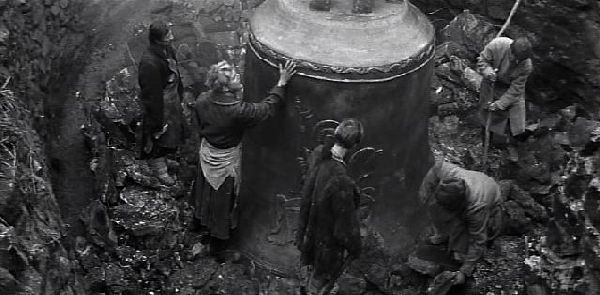Andrei Rublev (1966) 

Director: Andrei Tarkovsky
Cast: Anatoliy Solonitsyn, Ivan Lapikov, Nikolay Grinko
Synopsis: The life, times and afflictions of the fifteenth-century Russian iconographer.
Man, this was a tough movie to watch. I’d seen it once before, about three years before this viewing, and as I’d struggled then to sit through seemingly endless scenes in which not very much at all seemed to happened, I wasn’t looking forward to having to plough through it once more. I’ve got to admit that the second viewing wasn’t as difficult as the first, but it’s still a challenge to watch, not least because of its running time, which is more than three hours. Director Andrei Tarkovsky’s slow, deliberate style does little to help the viewer to decipher the messages he is attempting to convey simply because cinematic code-breaking is made immeasurably more difficult when you’re simultaneously waging a battle with eyelids that insist on closing. Let’s face it: almost everything up to the Tartar invasion in this movie is unremittingly dull. Thing’s get better from that point, as Tarkovsky embraces the broader themes of the apparently unresolvable conflict between religious faith and creative vision, particularly during a period of societal upheaval, but it’s still a bit of a slog at times.
The film charts the life of the eponymous icon painter during the mid-15th Century, a turbulent period in Russia’s history during which it suffered repeated invasions from the Tartars, and endured the rule of warring princes. Because very little is known about the real Rublev, much of what we see comes from the imaginations of Tarkovsky and co-writer Andrei Konchalovsky. Their vision of 15th Century Russia is of a brutal and forbidding society, seen through the religious Rublev’s eyes as he travels the country. He encounters a Pagan ritual, and is tied crucifix-like to the post of a barn while a naked woman attempts to seduce him. Rublev remains chaste, but is shaken by the encounter. Later, during an invasion by Tartar invaders, he kills a soldier who is about to rape a mentally retarded peasant girl, an act which creates an even greater crisis of faith, and he undergoes a lengthy vow of silence which is only broken when he witnesses the incredible faith of a young boy as he attempts to smelt a glorious giant bell.
As always, there are a number of scenes in Tarkovsky’s movie that are truly breath-taking, thanks to the work of Vadim Yusov, a frequent collaborator. But such arresting images do little to lighten the bleak tone of the storyline. Andrei Rublev is one of those intellectually challenging movies that proves divisive and creates a weird kind of enmity amongst the movie-going community. It’s champions criticise those who dislike it for lacking the necessary patience or intelligence to confront the complexity of the piece (‘go back to your Harry Potter/James Bond/Transformers movies’ is an all too common — and obvious — put-down on internet forums; an unfortunate message that reflects more badly on the person writing it than those to whom it’s addressed) while those who quite reasonably expect some level of entertainment from a film struggle to sit through that first hour. Both sides have a valid point, I suppose. Personally, I can see the thematic and artistic merit in what Tarkovsky has attempted, but just wish he’d found a more accessible way to get his message across.
(Reviewed 1st August 2012)
httpv://www.youtube.com/watch?v=8N5oiRPxUJ0
